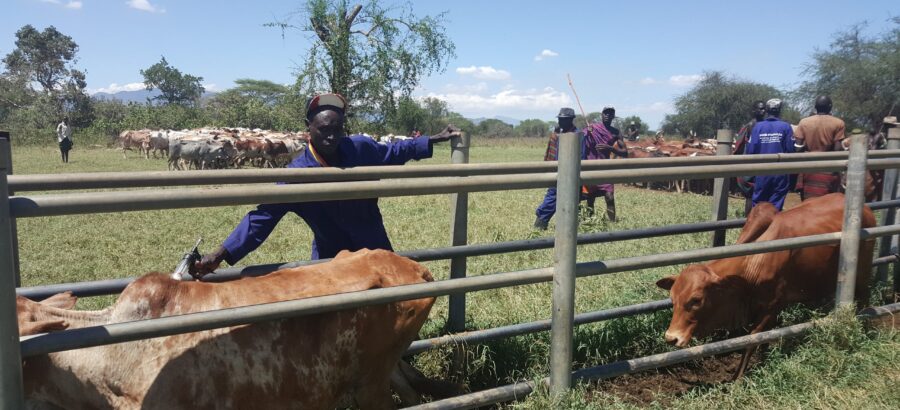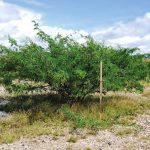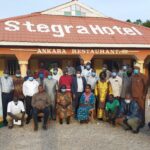Background
IGAD/ICPALD organized regional cross border meetings for regional and ecosystem harmonization and coordination of veterinary activities between bordering Member States out of South Sudan- Sudan bilateral MoU was signed by Ministers responsible for animal health in February, 2020 to strengthen cross-border coordination and cooperation in animal health and sanitary issues. The meeting further endorsed the developed implementation framework (IF) with four strategic objectives, clear outputs and activities to operationalize the MoU.
The implementation framework put in place coordination arrangements that included establishment of joint cross border steering committees (JSC) at national level and multidisciplinary technical committees (MTC) at sub-national levels to follow up; support and monitor implementation of agreed activities under various strategic objectives. Clear terms of references were also agreed for the JSC and MTC.
The one-day virtual meeting reviewed updates on the status of cross border animal health intervention in terms of surveillance and vaccination against TADs and developed a harmonized calendar for 2021 interventions.
Welcome and opening remarks
Dr. Alor Kwaj Kuol, Director of Epidemiology and Disease Information System opened the meeting on behalf of the CVO South Sudan. The meeting was also addressed by Dr. Meshack Malo, FAOR S. Sudan, Dr. Ibrahim ElMardi on behalf of FAOR, Sudan and Dr. S.J.M. Munyua, Director of IGAD Centre for Pastoral Areas and Livestock Development (ICPALD). All speakers appreciated the support provided by the European Union through the cross border project EU. Participants were alerted about the vibrant crossborder (CB) livestock trade through Amiet market in the Abyei Administrative Area, Northern Bahr El Ghazal and northern part of Jonglei state between the two countries. Livestock movement is further brought about during drought periods when in search of water and pasture. The latter movement is always from the Sudan to South Sudan states. These movements are associated with transmission of transboundary animal diseases that require cooperation and collaboration between the two countries for effective prevention and control.
Learning from the signed MoUs between Ethiopia–Kenya and Kenya-Uganda-Ethiopia-South Sudan; Ethiopia and Kenya launched synchronized / harmonized vaccination against priority TADs that led to vaccination of around 7.8 million heads of livestock between July- December, 2019. Similar synchronized vaccination was launched between Kenya and Uganda, which led to vaccination of around 1.3 million heads of livestock. This reduced frequent outbreak of TADs across their common borders and contributed to enhanced trade in livestock and livestock products.
The virtual meeting, held on 3 December 2020, was attended by 41 participants from Ministries of Animal Resources; S. Sudan and Sudan, FAO and NGOs from both countries and ICPALD.
Workshop objectives
- Launch the governance structure (JSC and MTC).
- Review cross border interventions undertaken by the national governments and development partners; surveillance and vaccination during the pandemic.
- Review efforts put in to raise national resources (from existing budget and manpower), ongoing projects and development partners that can support implementation of IF activities along selected borders and way forward on resource mobilization.
- Get updates on awareness creation, advocacy and lobbying going on for harmonized implementation of MoU areas of cooperation.
- Developed harmonized surveillance and vaccination calendar against common TADs for 2021.
Key plenary discussion
- Despite the COVID-19 containment movement restriction measures, countries are opening up and allowing international and national travels. FAO in South Sudan with a number of development partners have been carrying out livestock vaccination in the country. Moreover, with the approved COVID-19 vaccine in the offing, physical meetings will soon be possible, therefore, plans to launch synchronized vaccination against PPR across the common border like in Abyei Administrative Area (AAA) or Renk will be possible come 2021.
- In Abyei AA, security is still an issue which interrupts seamless vaccination of livestock even though it has been done on S. Sudan side. It will be good for the two governments to pursue peace by building on community peace established mechanisms such as the ones done pre- and post- migration dialogues. Peace agreement between the two communities will allow livestock interventions take place peacefully the way livestock trade in the established market has been going on well in AAA. Migration conference by FAO helped bring the communities together, which should be continued by the two governments.
- SSUDA has been working with UNMISS to train CAHWs and in building of livestock health infrastructure in Western Bank in Fashoda, and have realized peace building is very important.
- Establishment of labs in CB states by FAOSSD has been initiated in Abyei AA with a satellite lab and in other states. FAO has procured lab equipment already.
- Laid down community guidelines that regulate livestock movement during migration from Sudan in search of water and pasture is important to safeguard the environment and farm lands which controls trespassing on farm lands during such migration.
- Migration workshops- pre- & post: both communities from Ethiopia and S. Sudan participate together. They set rules to guide pastoralists’ movements between the two countries’ CB areas.
- LESP-SLSP action plan supports the refurbishment of existing veterinary check points and establishment of additional check points along state border to achieve project objective.
- Use of trained CAHWs is limited with availability of funds from the national government and development partners. Insecurity and poor road infrastructure affect animal health service delivery too in CB states.
- Fallata tribe from CAR cross through Upper Nile in SSD and move over to Gambella in Ethiopia in search of pasture and water for their livestock during drought. They are peaceful but sometimes destroy farm lands and cut trees during their migration. It will be good to engage them through community dialogues so that they can be prevailed upon to adhere to community mechanisms that preserve the environment and farm produce for mutual coexistence and sharing of resources. IGAD should seek support from AU to engage ECCAS to develop an MoU that will guide their migration into IGAD Member States South Sudan- Central Africa Republic.
Recommendations
- With the aid of FAO and IGAD, the two governments should plan to launch synchronized / harmonized surveillance and vaccination against priority TADs across their common borders starting in Abyei and Renk and slowly expand to reach other states.
- The two countries with support of FAO should undertake awareness creation about the signed MoU and endorsed implementation framework through field visits, community conferences/meetings, local FM Radio messages and dissemination of copies to the government authorities along cross border areas.
- The two governments with the support of development partners such as FAO, NGOs, IFAD among others should develop or improve crossborder infrastructures such as laboratories, water catchments, livestock markets, border/ check points among others and develop structures for shared utilization.
- The two governments should adapt information sharing protocol developed between Ethiopia and Kenya to enhance sharing of data on crossborder livestock population, occurrence of TADs, migratory routes, vaccination status and available natural resources (water and pasture) through established committee bodies and regulatory authorities.
- FAO, IGAD and the two countries should continue supporting ongoing programmes and initiate resource mobilization efforts for new cross border projects to ensure continuity of harmonized vaccination and surveillance for common TADs in the shared border.
- The two governments with support of development partners (FAO, IGAD, IFAD, NGOs etc) should address issues of environmental conservation in affected areas sometimes brought about by migrating Fallata tribe from Central Africa Republic.
- The two governments and development partners (FAO and NGOs) should strengthen indigenous peace building committees in conflict prone cross border states like Abyei AA to strengthen peace mechanisms to allow seamless implementation of animal health activities.
- The two governments with support of development partners should strengthen pre-and post- migration peace dialogues by including technical staff to ensure peaceful access to natural resources and government services by migrating communities.
- IGAD, FAO and South Sudan MoLF should develop an evidence-based factsheet clearly indicating economic losses occasioned by poor road infrastructure in some states and advocate at higher policy levels for resource allocation and seek support from WFP to construct or rehabilitate them for ease of doing business.
- IGAD and ECCAS should create collaboration with support of AU to develop an MoU on animal health and sanitary measure that will guide livestock migration from ECCAS to IGAD MS.






